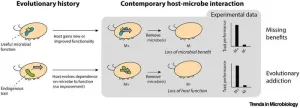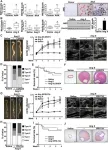(Press-News.org) We’ve long known that hosts malfunction without their microbiome—whether they are missing key microbial species or are completely microbe free. This malfunctioning is usually explained by the need for microbes to perform unique and beneficial functions, but evolutionary ecologist Tobin Hammer of the University of California, Irvine, is questioning that narrative.
In a peer-reviewed opinion article publishing August 29 in the journal Trends in Microbiology, Hammer argues that, in some cases, microbes might not actually be helping their hosts; instead, microbe-free hosts might malfunction because they have evolved an addiction to their microbes. In this case, hosts are dependent on the microbes to function, but the microbes don’t actually provide any benefits in return.
Evolutionary addiction is also sometimes called “evolved dependence,” and it could occur in any host system— from the human gut, to plant roots, to microbes that host other microbes. Hammer compares it to his own dependence on coffee.
“I need coffee to perform basic functions, but I do not perform them any better now than before the addiction began; I need coffee just to get back to normal,” writes Hammer (@toby_hammer). “The same process can occur with host-microbe symbioses: a dependence evolves without an improvement in functionality.”
Though the concept of evolutionary addiction has been discussed in the context of other symbiotic relationships—for example, herbivores and plants as well as parasites and their hosts—it has rarely been considered in the context of the microbiome. Hammer argues that evolutionary addiction should be considered when interpreting microbe-removal experiments because it might have unique implications for the evolution and stability of host-microbe interactions.
“By largely ignoring evolutionary addiction, the microbiome field has missed a plausible and likely common evolutionary explanation for microbially dependent host traits,” writes Hammer. “The host organism is a complex, internally interconnected system, and the absence of a microbe that has been integrated into it, like a cog in a machine, will cause components to malfunction.”
There are several possible ways that a host could become evolutionarily addicted to a microbe. During one pathway, hosts adapt to accommodate and function in the presence of microbes and in the process become dependent on them. This pathway is one explanation for how mammalian immune systems came to be dependent on gut microbes: if, as well as receiving benefits, a host experiences inflammation during the early stages of a symbiotic relationship, it might be selected to have a less-sensitive immune response. In this way, our immune systems have been calibrated to function in the presence of microbes and so their absence causes immune malfunction.
Alternatively, host species could become addicted to microbes that perform a similar function to an existing host trait. In this case, there is less selection pressure on the host to retain that trait, and so the host eventually loses the trait and becomes dependent on the microbe. One such example of evolutionary addiction is the wasp Asobara tabida, which is chronically infected with the bacterial endosymbiont Wolbachia and requires the bacteria in order to produce eggs. Other Asobara species that are not chronically infected with Wolbachia do not need the bacteria to produce eggs, and A. tabida does not have an improved ability to produce eggs because of Wolbachia; having the bacteria simply brings it back to baseline functionality.
Hammer notes that evolutionary addiction and missing benefits are not mutually exclusive, and in the case of some host-microbe pairs, both mechanisms could be at play. “One process may engender the other,” Hammer writes. “A microbe providing an adaptive function can be expected to spread among hosts, facilitating the subsequent evolution of dependence.”
Knowing whether hosts benefit from their microbes or are evolutionary addicted to them could help us predict the consequences of microbial biodiversity loss. Evolutionary addiction might be reversible in some cases if hosts can adapt to regain the lost function, either through genetic variation within their population or via new mutations. In contrast, if microbe-free hosts malfunction due to missing benefits—for example, a plant host that depends on rhizobia to fix nitrogen, an essential nutrient—then the plant is very unlikely to be able to adapt to losing those microbes because no plant has ever been able to independently fix nitrogen. Hammer notes that more work is needed to test this hypothesis.
“Reversibility matters when we consider disruptions of long-associated microbial symbionts,” Hammer writes. “Which traits, in which hosts, will evolution be able to rescue in the microbes’ absence?”
###
Trends in Microbiology, Hammer. “Why do hosts malfunction without microbes? Missing benefits versus evolutionary addiction” https://cell.com/trends/microbiology/fulltext/S0966-842X(23)00224-X
Trends in Microbiology (@TrendsMicrobiol), published by Cell Press, is a monthly review journal that provides a multidisciplinary forum for the discussion of all aspects of microbiology—from cell biology and immunology to genetics and evolution—and ranges across virology, bacteriology, protozoology, and mycology. Visit http://www.cell.com/trends/microbiology. To receive Cell Press media alerts, please contact press@cell.com.
END
Scientists at Rice University in Houston, Texas have developed a fabric-based wearable device that “taps” a user’s wrist with pressurized air, silently helping them navigate to their destination. The study, published August 29 in the journal Device, demonstrated that users correctly interpreted which direction the device was telling them to go an average of 87% of the time. Since the wearable embeds most of its control system within the fabric itself, using air instead of electronics, it can be built lighter and more compact than existing designs.
“We envision this device will be used by individuals who need or desire information to be transmitted ...
About The Study: The results of this study of 61,000 mother-child dyads suggest that postnatal selective serotonin reuptake inhibitor (SSRI) treatment was associated with a reduced risk of postnatal depression–associated maternal mental health problems and child externalizing behaviors across early childhood years. These findings suggest that postnatal SSRI treatment may bring benefits in the long term to women with postnatal depression and their offspring.
Authors: Chaoyu Liu, M.D., Ph.D., of King’s College in London, is the corresponding author.
To access the ...
About The Study: In this study of primary care patients in a state with legal recreational cannabis use, cannabis use disorder (CUD) was common among patients who used cannabis. Moderate to severe CUD was more prevalent among patients who reported any nonmedical use. These results underscore the importance of assessing patient cannabis use and CUD symptoms in medical settings.
Authors: Gwen T. Lapham, Ph.D., M.P.H., M.S.W., of the Kaiser Permanente Washington Health Research Institute in Seattle, is the corresponding author.
To access the embargoed study: Visit our For The Media website at this ...
UNDER EMBARGO UNTIL 11:00 A.M. EDT ON TUESDAY, AUGUST 29, 2023
Social media’s effects on propagating misinformation among the lay public are widely debated, but a new paper from JAMA suggests physicians using social media are revolutionizing medical education.
La Jolla, Calif. (August 29, 2023) — Ever wonder what your doctor is doing on social media? A new study published in JAMA led by John W. Ayers, Ph.D., from the Qualcomm Institute within the University of California San Diego, finds some physicians are harnessing the reach ...
New research led by the Institute of Psychiatry, Psychology & Neuroscience (IoPPN) at King’s College London has found that selective serotonin reuptake inhibitor (SSRI) treatment for postnatal depression is associated with improvements in child behaviour up to five years after childbirth.
Up to 15% of women experience postnatal depression which has been shown to be associated with poor outcomes for mothers’ and their children. Researchers at King’s IoPPN, in collaboration with the University of Oslo, analysed data from ...
CORVALLIS, Ore. – In northern Yellowstone National Park, saplings of quaking aspen, an ecologically important tree in the American West, are being broken by a historically large bison herd, affecting the comeback of aspen from decades of over-browsing by elk.
Findings of the research led by Luke Painter of Oregon State University were published today in Ecology and Evolution.
The study comes five years after Painter, who teaches ecology and conservation in the OSU College of Agricultural Sciences, published a paper in Ecosphere showing that wolf reintroduction in Yellowstone had been a catalyst for aspen recovery both outside and ...
INDIANAPOLIS -- LOINC® from Regenstrief Institute is issuing its semiannual content update with 1,945 new concepts to help health systems, laboratories and other health organizations exchange medical data. The release contains newly created content based on requests submitted by stakeholders from more than 100 countries.
LOINC version 2.75 is available for download from the LOINC website and via the LOINC Terminology Service using HL7® FHIR®. The updated version includes new, edited and newly mapped concepts ...
Jason Yang has been awarded nearly $400,000 from the National Institute on Aging to explore the role of lifestyle physical activity (light movements, walking) in cognition among insufficiently active older adults with higher risks for Alzheimer’s or related dementias. The exercise science assistant professor will use the two-year R21 grant to help determine if frequent and regular engagement in lifestyle physical activity over time may benefit cognitive function for this population.
A ...
Sleep is a critical part of a child’s overall health, but it can also be an important factor in the way they behave.
According to a new study from the Youth Development Institute at University of Georgia, getting enough sleep can help children combat the effects of stressful environments.
“Stressful environments are shown to make adolescents seek immediate rewards rather than delayed rewards, but there are also adolescents who are in stressful environments who are not impulsive,” said lead author Linhao Zhang, a fourth-year doctoral student in UGA’s College of Family and Consumer Sciences. “We looked at what explains that link and what makes some people ...
Abdominal aortic aneurysm (AAA), a common degenerative vascular disease, particularly afflicts men over the age of 60, with up to 8% affected. Characterized by the abnormal dilation of the abdominal aorta, AAA risks a potentially fatal rupture. Despite increasing research efforts, effective pharmaceutical strategies to curb aneurysm growth remain elusive.
In a study published in the journal of Genes & Diseases, researchers from Sant Pau Hospital Research Institute and Biomedical Research Institute Sant Pau scrutinized the Wnt signaling pathway's deregulation in human abdominal aortic aneurysm (AAA). This ...






